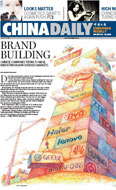Old menaces reappear
Updated: 2011-02-25 10:17
(China Daily European Weekly)
Rocketing international oil prices, which topped $100 (73 euros) a barrel on Wednesday, is not a new danger to the world economy. It comes as a stark reminder of how little the international community has done to address long-term challenges while focusing excessively on short-term measures to cope with the world's present problems.
From Davos to Paris, the global elite and policymakers have failed to recognize the looming risk of the double whammy of record food prices and soaring oil prices.
It is high time to make a quick review of the effect of measures that different countries adopted to fight the global recession. If the world economy is to avoid a double-dip, those stimulus measures of dubious short-term benefits but serious long-term consequences must be ended now.
Amid reports and concerns over the continued unrest in oil-rich Middle East and North Africa, international crude oil prices briefly breached the threshold of $100 a barrel on Wednesday for the first time since October 2008.
Some people have deemed pricier oil as a new danger to the ongoing global recovery, as the spike in oil is set to deal many economies a heavy blow.
At a moment when world trade has just regained the levels it reached before the 2008 financial crisis, largely driven by rapidly rising emerging market exports and imports, it might be frustrating to see higher oil prices slowing global growth again.
Yet, expensive oil and food are nothing new to the international community, which saw them both just three years ago. It has taken the worst global financial and economic crisis in seven decades to significantly bring down record-high oil prices at $147 a barrel and soaring food prices that caused social unrest in a number of developing countries in 2008.
But now, with food prices surpassing the levels of the 2007-2008 food crisis and oil prices shooting above $100 a barrel, the global recovery looks more fragile than ever. Worse, after a round of massive stimulus in the past two years, global policymakers have little room left for further demand stimulus.
Some policymakers from debt-laden rich countries have patted themselves on the back for hauling the world economy out of a global crisis, but that could be premature.
The darkening prospect that the world might have to live with a sustained period of soaring oil and food prices has only laid bare the fallacy that policymakers can possibly save the world economy with all sorts of quick fixes like printing more money.
The surge of food and oil prices amounts to a reality check on the limit of short-term measures that only tinker with the problem rather than rebuilding the global economic and financial systems.
Even though unrest in oil-rich regions helped fuel present uncertainties over oil prices, policymakers around the world should know that we can no longer afford to ignore these long-term problems.
E-paper

Factory fever
Despite auto manufacturing bubble scare, car giants gear up expansion of factories.
Dressed for success
Fabric of change
High spirits
Specials

Earthquake Hits Japan
A massive 8.8 magnitude quake hit the northeast coast of Japan on March 11,2011.

NPC & CPPCC sessions
Lawmakers and political advisers gather in Beijing to discuss major issues.

Slide: Japan quake
Devastating earthquake and tsunami left millions without water, electricity, homes or heat.
